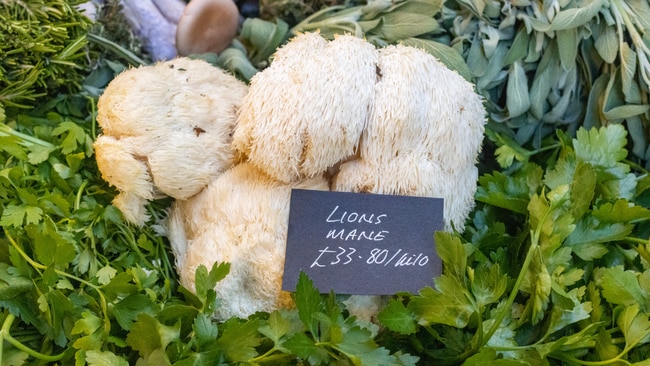Mushroom coffee is the latest health trend – but does it actually work?
An iced soy mushroom latte, please

Lifestyle
Don't miss out on the headlines from Lifestyle. Followed categories will be added to My News.
You've heard of honey and mayonnaise coffee, but have you heard of mushroom coffee? An ever-growing trend online, we asked the experts if there's any weight to its purported nutritional benefits.
If 2023 meant one thing in the nutritional world, it was the year of putting strange things in our coffee.
We started the year by adding lemon to our morning brews for weight loss, claiming it ‘melts fat’ and provides relief from aches and pains. As of May there was no real data to back that app, and nothing much has changed.
Then, we moved on to mayonnaise coffee, which people liked for its 100 per cent fat content, which means it doesn’t ruin ketosis, thus helps to burn calories and also helps to maintain energy and keep you fuller, for longer.
Like what you see? Sign up to our bodyandsoul.com.au newsletter for more stories like this.
Next up was salt coffee, which was dubbed the flavour enhancer we’d been waiting for, as its chemical makeup acts as a barrier for our tongues picking up bitterness while heightening our experience of sweetness.
Then came honey coffee which doesn't actually refer to adding honey into our brews, but opting for coffee beans processed with their mucilage still on, which makes it sweeter.
In October, Brody Jenner even admitted to making coffee with breast milk, which, tbh, we wished we never knew and it’s lived rent-free in our minds for months.
Now, there’s a new rendition. People online are saying that rather than focusing on the milk or beans in your brews, everyone should be adding mushrooms into their cups of coffee – claiming the health benefits will blow your mind.
Sceptical about the science behind this one? So were we, so we asked nutritionist Brooke Kelly to shed some light on the data.

What is mushroom coffee?
Mushroom coffee refers to speciality blends of coffee that contain whizzed-up mushrooms, which has sparked an online obsession.
Many brands have started creating these hybrid blends due to an increased interest in gut health, and the supposed benefits fungi has on your microbiome. But people have started creating their own DIY version at home, too.
As per most things that surface online these days, it’s not exactly a new concept. Reportedly, people in Finland drank mushroom coffee during World War II when beans were scarce, and mushrooms are often used as ingredients in Chinese medicine too.
Are there nutritional benefits to adding mushrooms to coffee?
“Medicinal mushrooms do have a variety of benefits, however, there is little evidence to confirm whether these still carry across when added to your morning coffee,” clinical nutritionist Brooke Kelly tells Body+Soul.
“We do know that caffeine can interfere with the absorption of some nutrients in the body such as calcium, iron, magnesium and B vitamins which could ultimately affect the body's ability to utilise some of the benefits of these mushrooms.”
However, that being said, mushroom coffee blends will contain less caffeine than a regular brew, which could have benefits too.
“Absorption concerns aside, there may still be a synergistic benefit of adding mushrooms to coffee,” Kelly continues.
“Reishi is a type of functional mushroom that contains antioxidant compounds that have been shown to help lower the stress hormone cortisol and aid in the management of anxiety.
“As caffeine works to increase cortisol in the body, there is a plausible theory that adding reishi may help have an ‘adaptogenic effect’ and help to stabilise cortisol output to help the body better cope with stress, however the evidence still remains unclear.”

What types of mushrooms should people mix into coffee?
“There are a variety of mushrooms that boast benefits in dealing with a range of concerns,” says Kelly. “The beauty is that you can mix and match these or you can even find mushroom complexes now that contain a couple.”
If you’re looking for the best place to start, Kelly says “some of the more popular and well-researched include Chaga for its strong antioxidant properties, Cordyceps which may boost natural immunity and improve energy levels, and both Lion’s Mane and Shiitake for improving the gut microbiome and helping manage inflammatory bowel disease.”
Does it need to be fresh mushrooms or can you use powders?
So, say you’re on board the mushroom coffee trend. Now you need to know how best to go about it. However, according to Kelly, the specifics are still a bit up in the air.
“Whether medicinal mushrooms are best consumed fresh or dried is questionable,” she says.
“There is a possibility that the processing of mushrooms may contribute to a nutrient loss, however one study did find that oyster mushrooms that were freeze dried were still able to significantly decrease cholesterol in the body.”
Kelly also references a theory that extracts, particularly that of mushrooms, may lose their potency, thus efficacy, after time – kind of like half-life of chemicals. One study found that the antioxidant component began to steadily decrease after 4 months.
“As with most things in our diet, eating food in its whole form is usually best,” she says. “However functional mushroom supplements may offer consumers better ease and convenience than if they were sourcing these whole.”
As with many things – the variety that you will actually use is the type that’s recommended. (See also: sunscreen).

Are there any side effects of drinking mushroom coffee?
Since the hard data on mushroom coffee is still a work in progress, there’s no concrete answer on this one – which is a surefire sign that you should proceed with caution.
“As we are still learning, we aren’t fully aware if mushroom supplementation could have potential interactions with prescription medications or other adverse effects, particularly in pregnant or breastfeeding women, so it’s always good to err on the side of caution,” says Kelly.
“There is some data that shows Reishi can cause dizziness, dry mouth, nausea, rash and an upset stomach. However, the use of medicinal mushrooms is probably safe overall.”
That being said, as is the case with all mushroom consumption, you should only use mushrooms you know are safe – thus, ones you can buy in the supermarket or a health food store, not ones foraged yourself.
We also suggest buying a pre-mixed blend and following the preparation instructions on the packet, so you know you’ll be safe.
Is mushroom coffee the only way to source these nutritional benefits?
Not at all. “Although mushrooms have ‘superfood ’-like qualities, you do not have to fork out cash on expensive supplements to get the same health benefits,” says Kelly.
“A balanced and diverse wholefood diet that’s high in plant foods is naturally rich in antioxidant compounds, vitamins and minerals which all work to support your health and prevent disease.”
So if you’re keen to try mushroom coffee then go ahead, but if you’d rather a simple trip to the supermarket for some vegetables and drinking your regular soy flat white, then that’s more than fine too.
Originally published as Mushroom coffee is the latest health trend – but does it actually work?



